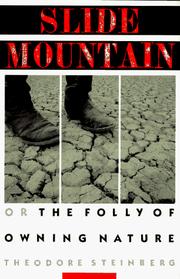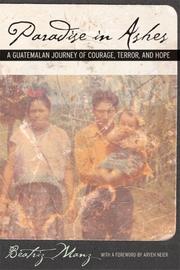| Listing 1 - 4 of 4 |
Sort by
|
Book
Year: 2017 Publisher: Washington, D.C. : The World Bank,
Abstract | Keywords | Export | Availability | Bookmark
 Loading...
Loading...Choose an application
- Reference Manager
- EndNote
- RefWorks (Direct export to RefWorks)
It is acknowledged that conflict over land is a major source of violence in various parts of Mindanao, particularly the prosed Bangsamoro region. Historical accounts trace the root cause of land issues and identity-based conflict to the introduction of the Regalian doctrine of land ownership by Spanish colonizers. During the American colonial regime at the turn of the 20th century, dispossession of land held by the original inhabitants of Mindanao accelerated, with an emphasis of titling lands for private ownership that clashed with the tradition of ancestral domain. This was further exacerbated by migration instigated by the central government, starting with the development of "agricultural colonies: in the early 1900s to 1940s, to the passage of a series of land reform laws from the 1960s until the end of the 1980s to encourage individual land titling as a strategy for agricultural development. These evens radically altered land ownership patterns in Mindanao, as communal ownership of land by its original inhabitants gave way to individual titles in the possession of settlers from Luzon and the Visayas.
Demographics --- Land Administration --- Land Disputes --- Law and Development --- Law and Justice --- Legal Reform --- Mining --- Natural Disasters --- Private Sector Development --- Rural Development --- Rural Land Policies for Poverty Reduction
Book
Abstract | Keywords | Export | Availability | Bookmark
 Loading...
Loading...Choose an application
- Reference Manager
- EndNote
- RefWorks (Direct export to RefWorks)
There is broad recognition, across the political spectrum and in both 'northern' and 'southern' countries, that justice reform, and more generally the promotion of the 'rule of law', are central to development policy, particularly in conflict-affected, fragile and violent contexts. More recently an increased focus on global security and the interaction between security and development as put a renewed emphasis on such efforts. However, while legal, regulatory and 'justice' institutions are now seen as key part of the 'solution' to problems of conflict, fragility and development, this recognition is not matched by a correspondingly clear sense of what should be done, how it should be done, by whom, in what order, or how 'success' may be determined. There often tends to be a clear misunderstanding of both the nature of the problem and (thus) of the solution. In this paper, the author seek to provide some insight into these questions and sketch out a practical conception of effective justice reform in situations of conflict and fragility that may provide the basis for effective programming.
Access to Justice --- Accountability --- Administrative Law --- Arbitration --- Armed Forces --- Bankruptcy --- Bribery --- Children and Youth --- Civil Society Organizations --- Common Law --- Conflict and Development --- Conflict Resolution --- Constitutions --- Corruption --- Corruption & anticorruption Law --- Courts --- Customary Law --- Discrimination --- Economic Development --- Elections --- Empowerment --- Equality --- Federalism --- Foundations --- Freedom of Information --- Gangs --- Gender --- Genocide --- Good Governance --- Homicide --- Human Rights --- Informal Sector --- Inheritance --- International Cooperation --- International Donors --- International Law --- Judicial Reform --- Judiciary --- Jurisdiction --- Land Disputes --- Law and Development --- Leadership --- Legal Aid --- Legal Products --- Legislation --- Legislative Process --- Mediation --- Patronage --- Peacebuilding --- Political Parties --- Political Will --- Post Conflict Reconstruction --- Privatization --- Property Rights --- Public Opinion --- Rule of Law --- Sanctions --- Separation of Powers --- Social Development --- Technical Assistance --- Theft --- Transparency --- Universities --- Violence --- War Crimes --- Youth

ISBN: 9786612355028 1282355023 0520918460 0585041121 0520087631 0520207092 9780520918467 9780585041124 9780520087637 9780520207097 Year: 1995 Publisher: Berkeley University of California Press
Abstract | Keywords | Export | Availability | Bookmark
 Loading...
Loading...Choose an application
- Reference Manager
- EndNote
- RefWorks (Direct export to RefWorks)
The drive to own the natural world in twentieth-century America seems virtually limitless. Signs of this national penchant for possessing nature are everywhere-from suburban picket fences to elaborate schemes to own underground water, clouds, even the ocean floor. Yet, as Theodore Steinberg demonstrates in this compelling, witty look at Americans' attempts to master the environment, nature continually turns these efforts into folly. In a rich, narrative style recalling the work of John McPhee, Steinberg tours America to explore some of the more unusual dilemmas that have arisen in our struggle to possess nature. Beginning along the Missouri River, Steinberg recounts the battle for three thousand acres of land the river carved from a Nebraska Indian reservation and deposited in Iowa. Then he travels to Louisiana, where an army of lawyers butted heads over whether Six Mile Lake was actually a lake or a stream. He continues to Arizona to investigate who owned the underground, then to Pennsylvania's Blue Ridge Mountains to see who claimed the clouds. He ends in crowded New York City with Donald Trump's struggle for air rights. Americans' obsession with owning nature was immortalized by Mark Twain in the tale of Slide Mountain, where a landslide-prone Nevada peak turned the American dream of real estate into dust. In relating these modern-day "Slide Mountain" stories, Steinberg illuminates what it means to live in a culture of property where everything must have an owner.
Land tenure -- United States. --- Land tenure. --- Land use -- United States. --- Land use. --- Real property -- United States. --- Real property. --- Land tenure --- Land use --- Real property --- Business & Economics --- Real Estate, Housing & Land Use --- Cadastral surveys --- Catastral surveys --- Freehold --- Limitations (Law) --- Property, Real --- Real estate --- Real estate law --- Realty --- Land --- Land utilization --- Use of land --- Utilization of land --- Agrarian tenure --- Feudal tenure --- Land ownership --- Land question --- Landownership --- Tenure of land --- Law and legislation --- Property --- Rent --- Economics --- Land cover --- Landscape assessment --- NIMBY syndrome --- Land use, Rural --- Land, Nationalization of --- Landowners --- Serfdom --- 20th century. --- academic. --- air rights. --- american history. --- cultivating land. --- domination. --- environment. --- fulton county. --- indian reservation. --- land disputes. --- land ownership. --- land rights. --- landmarks. --- louisiana. --- natural world. --- nature. --- new york. --- ownership. --- preservation. --- private property. --- property rights. --- property. --- real estate. --- scholarly. --- six mile lake. --- united states history. --- us history. --- water rights. --- water.

ISBN: 0520939328 1597347949 9780520939325 1417522704 9781417522705 9781597347945 0520240162 9780520240162 0520246756 9780520246751 Year: 2004 Volume: 8 Publisher: Berkeley University of California Press
Abstract | Keywords | Export | Availability | Bookmark
 Loading...
Loading...Choose an application
- Reference Manager
- EndNote
- RefWorks (Direct export to RefWorks)
Paradise in Ashes is a deeply engaged and moving account of the violence and repression that defined the murderous Guatemalan civil war of the 1980's. In this compelling book, Beatriz Manz-an anthropologist who spent over two decades studying the Mayan highlands and remote rain forests of Guatemala-tells the story of the village of Santa María Tzejá, near the border with Mexico. Manz writes eloquently about Guatemala's tortured history and shows how the story of this village-its birth, destruction, and rebirth-embodies the forces and conflicts that define the country today. Drawing on interviews with peasants, community leaders, guerrillas, and paramilitary forces, Manz creates a richly detailed political portrait of Santa María Tzejá, where highland Maya peasants seeking land settled in the 1970's. Manz describes these villagers' plight as their isolated, lush, but deceptive paradise became one of the centers of the war convulsing the entire country. After their village was viciously sacked in 1982, desperate survivors fled into the surrounding rain forest and eventually to Mexico, and some even further, to the United States, while others stayed behind and fell into the military's hands. With great insight and compassion, Manz follows their flight and eventual return to Santa María Tzejá, where they sought to rebuild their village and their lives.
Quiché Indians --- Massacres --- Political violence --- Civil-military relations --- Return migration --- Migration, Return --- Emigration and immigration --- Repatriation --- Military and civilian power --- Military-civil relations --- Executive power --- Sociology, Military --- Military government --- Violence --- Political crimes and offenses --- Terrorism --- Atrocities --- History --- Persecution --- K'iche' Indians --- Quichés --- Indians of Central America --- Mayas --- Crimes against --- Relocation --- Ejército Guerrillero de los Pobres (Guatemala) --- EGP --- E.G.P. --- Santa María Tzejá (Guatemala) --- Social conditions. --- Politics and government. --- Quiche Indians --- Santa Maria Tzeja (Guatemala) --- Social conditions --- Politics and government --- Quiche Indians - Crimes against - Guatemala - Santa Maria Tzeja --- Quiche Indians - Relocation - Mexico --- Massacres - Guatemala - Santa Maria Tzeja --- Political violence - Guatemala - Santa Maria Tzeja --- Civil-military relations - Guatemala - Santa Maria Tzeja --- Return migration - Guatemala - Santa Maria Tzeja --- Santa Maria Tzeja (Guatemala) - Social conditions --- Santa Maria Tzeja (Guatemala) - Politics and government --- 1980s. --- 20th century. --- anthropologists. --- central america. --- cultural history. --- ethnography. --- guatemala. --- guatemalan civil war. --- guerrillas. --- historians. --- historical perspective. --- history of violence. --- illustrated. --- indigenous histories. --- land disputes. --- latin american history. --- maps. --- maya peasants. --- mayan highlands. --- mexico. --- nonfiction. --- paramilitary forces. --- political conflict. --- rainforests. --- refugees. --- repression. --- santa maria tzeja. --- social sciences. --- textbooks. --- united states. --- village life. --- war. --- Ejercito Guerrillero de los Pobres (Guatemala)
| Listing 1 - 4 of 4 |
Sort by
|

 Search
Search Feedback
Feedback About UniCat
About UniCat  Help
Help News
News